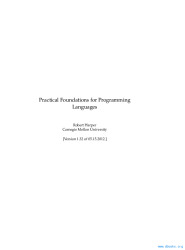Practical Foundations for Programming Languages
In this way we establish a foundation for the study of programming languages. But why these particular methods? The main justification is provided by the book itself. The methods we use are both precise and intuitive, providing a uniform framework for explaining programming language concepts. Importantly, these methods scale to a wide range of programming language concepts, supporting rigorous analysis of their properties. Although it would require another book in itself to justify this assertion, these methods are also practical in that they are directly applicable to implementation and uniquely effective as a basis for mechanized reasoning. No other framework offers as much.
Table of contents
- Judgments and Rules
- Syntactic Objects
- Inductive Definitions
- Hypothetical and General Judgments
- Statics and Dynamics
- Statics
- Dynamics
- Type Safety
- Evaluation Dynamics
- Function Types
- Function Definitions and Values
- Godel's T
- Plotkin's PCF
- Finite Data Types
- Product Types
- Sum Types
- Pattern Matching
- Generic Programming
- Infinite Data Types
- Inductive and Co-Inductive Types
- Recursive Types
- Dynamic Types
- The Untyped -Calculus
- Dynamic Typing
- Hybrid Typing
- Variable Types
- Girard's System F
- Abstract Types
- Constructors and Kinds
- Subtyping
- Subtyping
- Singleton Kinds
- Classes and Methods
- Dynamic Dispatch
- Inheritance
- Exceptions and Continuations
- Control Stacks
- Exceptions
- Continuations
- Types and Propositions
- Constructive Logic
- Classical Logic
- Symbols
- Symbols
- Fluid Binding
- Dynamic Classification
- State
- Modernized Algol
- Assignable References
- Laziness
- Lazy Evaluation
- Polarization
- Parallelism
- Nested Parallelism
- Futures and Speculations
- Concurrency
- Process Calculus
- Concurrent Algol
- Distributed Algol
- Modularity
- Components and Linking
- Type Abstractions and Type Classes
- Hierarchy and Parameterization
- Equational Reasoning
- Equational Reasoning for T
- Equational Reasoning for PCF
- Parametricity
- Process Equivalence
- Appendices
- Finite Sets and Finite Functions
| Pages : | 590 |
| Size : | 3.0 MB |
| File type : | |
| Downloads: | 151 |
| Created: | 2022-02-03 |
| License: | CC BY-NC-ND |
| Author(s): | Robert Harper |

Warning: Trying to access array offset on false in /home/tutovnfz/public_html/article.php on line 233
Others programming Tutorials
Certified Programming with Dependent Types
Fundamentals of Python Programming
An Introduction to C & GUI Programming
Others related eBooks about Practical Foundations for Programming Languages
Perl tutorial for professionalsDownload free Perl tutorial course in PDF, training file in 39 chapters and 109 pages. Free unaffiliated ebook created from Stack OverFlow contributor....
Programming for Computations - MATLAB/OctaveDownload free course Programming for Computations - MATLAB/Octave, pdf file on 228 pages by Svein Linge, Hans Petter Langtangen....
OpenCOBOL Guide for programmersThis PDF tutorial describes the syntax and usage of the COBOL programming language as implemented by the current version of OpenCOBOL ,it's a free training document under 259 pages designated to intermediate users level....
Ruby Hacking GuideThe Ruby Hacking Guide is a book that explains how the ruby interpreter (the official C implementation of the Ruby language) works internally. To fully understand it, you need a good knowledge of C and Ruby. This book is going to investigate ruby as a whole....
GUI Design for Android AppsGUI Design for Android Apps is the perfect - and concise - introduction for mobile app dev..., download free Android tutorial in PDF (156 pages) created by ....
VB.NET Quick GuideThe purpose of this PDF tutorial is to provide a quick learning guide to programming for the students who wants to buils their own application with Microsoft VB.Net ....
Python for You and MeDownload free course Python for You and Me, pdf file on 173 pages by Kushal Das....
C++ Notes for ProfessionalsDownload free course C++ Notes for Professionals, pdf file on 707 pages by Stack Overflow Community....
Android Application Development for the Intel PlatformDownload free course Android Application Development for the Intel Platform, pdf file on 508 pages by by Ryan Cohen, Tao Wang....
Getting started with PowerShellDownload free tutorial about PowerShell, it's a powerful and very flexible language that is relatively easy to understand. PowerShell allows you as a system administrator to create scripts that help you automate certain tasks in a simple and very practical way....